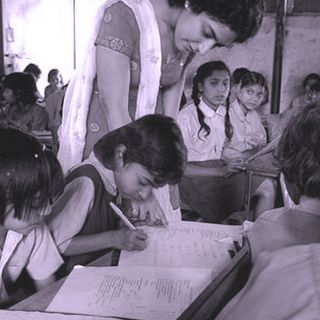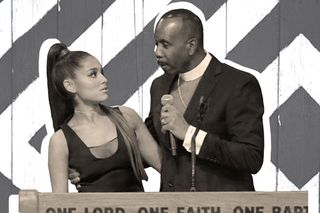
When a Bishop Can Grope Ariana Grande on Live TV, What Does It Mean for the Rest of Us?
We still aren’t holding people accountable in a post-#MeToo world.

“Is it really that bad? I’m sure it’s not that bad,” dismissed a male friend amidst my rant about gender inequality at workplaces. I developed laser vision, burnt his body to a cinder, then the bodies of all men in the world, and equality reigned forever.
If only.
It’s been less than a year since the Weinstein allegations and the #MeToo movement exploded. Less than 12 months later, nothing major has changed. An idiot man wore a ‘Weinstein is Innocent’ t-shirt, Louis CK was rewarded with a standing ovation for his first performance since admitting to years of sexual misconduct, and Ariana Grande was molested by a bishop – A BISHOP – on live TV. Just another day in paradise, warbles Phil Collins somewhere.
At a setting no less somber than the funeral of the Queen of Soul, Aretha Franklin, Bishop Charles H. Ellis III thought it was okay to grab Grande, practically by the breast, and keep digging his fingers into her while making a racist, demeaning joke that compared her to a Taco Bell menu item. While Grande performed, ex-President Bill Clinton gave her the once-over he reserves for interns in the White House.
Ellis was forced to tender a lame-ass public apology thanks to the ensuing uproar. “Maybe I was too friendly,” he half-assed. And maybe Jack the Ripper disliked women slightly, eh?
Images of Ariana’s expression and body language have been shared again and again – millions of women are reliving times in their lives when men have put their hands on them, against their will, and in scenarios where they felt they could not speak out.
On that stage, Ariana looks uncomfortable, mortified, and afraid. I mean, how many people were on that podium? And how many more were watching? And the bishop still got away with groping a star – in full view of the world. Ariana, I’m scared, too. I’m sending you strength and good vibes, but I get it. If this is how men are when the cameras are on, what happens in private? If the bishop was okay with grabbing a young woman by the breast when the world was looking at him, what must he be up to in the dominion of his congregation?
Society conditions us to behave better when the camera is on: “Stand up straight for your picture!” Is it men’s egos that allow them to expect a free pass? An ‘I can do whatever I want, and no one can stop me’ attitude? Is it the fact that whether private or public, there seem to be no real, lasting repercussions for predators? Do instances like the one we have witnessed, instances like the bishop and the minimal amount of consequences he has faced, send out a dangerous message to all of us?
For the past two years now, Donald Trump has been echoing this attitude very publicly – a disrespect for women mingled with a sense of entitlement over women’s bodies. Grab them by the pussy or anywhere else, on camera or elsewhere – there won’t be any lasting consequences. Centuries of deeply ingrained sexual harassment as well as victim blaming (“Why was she wearing such a short dress to a funeral?”) will ensure that nothing happens to the predator.
Off-camera, we’re slowly beginning to see the reverberations of #MeToo in several professional arenas in India. On the other hand, we’re also watching the struggles of victims to make themselves heard in real time. Sectors like academia and the law are full of whispered accusations and threats of retribution. Raya Sarkar’s list of known offenders sent shockwaves through the country before disappearing. Justice SK Gangele was cleared of charges that he’d harassed a subordinate judge because it could not be ‘proved.’ The latter just lays bare the problem doesn’t it? You can work for the system, be part of it and yet, it will fail you.
In Chandigarh, the complaints of junior women doctors being molested by patients and their relatives have now come to light. And over at Air India, our subcontinent’s national carrier, as many as 12 pending cases of sexual harassment exist, while officials gave no reasons for their delay in action against the offenders.
Despite #MeToo, despite high profile cases, despite repeated social media outrage, and more – Ariana Grande was still groped on TV. What does this say about our society? Have men been listening at all this past year? Do we have an accountability to women, about society’s debt to womenkind, about how the authorities will not just enforce discipline now, but change mindsets for the future?
The easy answer to these questions is negativity; and a resignation to the present. The tougher answer is to change history and the future every single day – to make every single incident a tipping point, one that changes mindsets, attitudes and behaviours. The difficult thing to do now, is to keep talking about these incidents, and why we need change.
Akhila Vijaykumar is a writer with experience across advertising and journalism. Occasionally, the crossover does make her demand truth from soap and try to cajole quotes into starbursts, but no harm no foul. She loves books by Terry Pratchett, dogs and pizza, often at the same time.
Related


Children’s Books Are Perpetuating Math and Science Gender Stereotypes
